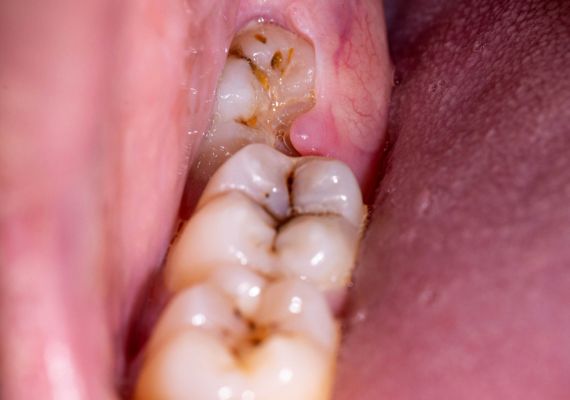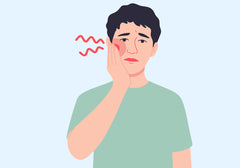Key takeaways:
An impacted tooth is a tooth that has complications while erupting.
Impacted teeth can be asymptomatic but can develop into a serious issue if neglected.
You should address an impacted tooth with a dental professional before it turns into an infection or cyst.
Impacted teeth are most commonly wisdom teeth and happen in our late teens and early adulthood.
Impacted teeth are frequently related to crowding or issues with the amount of space in your jaw.
Impacted teeth can cause headaches, jaw pain, bad breath, and inflammation if neglected.
Treatment can vary heavily depending on the severity, from an extraction to a long-term care plan.
The extraction of an impacted tooth depends heavily on its complexity and position in your mouth.
Table of Content
Symptoms of an impacted tooth

The symptoms of an impacted tooth can be either mild or severe. It's good to be aware of the symptoms so you can properly identify if you have an impacted tooth. Some of the most common symptoms are:
-
Jaw pain or soreness around a tooth: A painful or sore jaw is a common sign of an impacted tooth. When a tooth does not erupt properly, it can put pressure on the jawbone and surrounding teeth. This causes pain and inflammation.
-
Persistent headaches: As mentioned before, an impacted tooth can put pressure on your jawbone. This pressure can also trigger your trigeminal nerve, leading to headaches.
-
Swelling or redness in your gums: Teeth that haven't erupted properly can push against nearby tissue and trap leftover pieces of food. This can lead to swelling and redness because of the irritated tissue or bacterial accumulation from the leftover food.
-
Bad breath: A tooth that has failed to erupt properly can create a pocket that traps food particles and bacteria over time. This causes a foul taste in your mouth and bad breath.
-
Swollen lymph nodes: Swollen lymph nodes on your neck or directly under your jaw are a sign of an impacted tooth. They are a clear indicator that your body is fighting off an infection, which could be caused by an impacted tooth.
-
Difficulty opening your mouth: Due to the jaw strain caused by an impacted tooth, you may experience issues with opening your mouth all the way.
-
Infections, cysts, and damage to other teeth: The oral hygiene issues an impacted tooth causes can lead to serious infections, dentigerous cysts, and damage to other teeth. If you notice a high fever, a painful growth, or tooth decay, you may have an impacted tooth.
Causes of impacted teeth

There are many causes for an impacted tooth. A painful or infected impacted tooth can be seriously disruptive; being aware of what the root cause could be is essential. Here is a quick breakdown of some of the causes:
-
Overcrowding: If your teeth are far too close to each other, it can cause impacted teeth. Your jaw won't have enough space for a tooth to erupt properly, which leads to impaction.
-
Tooth positioning: A tooth can be twisted or at the wrong angle when it comes out. This can lead to it getting painfully stuck in your gum or bone.
-
Early loss of baby teeth: Losing your baby teeth earlier than you should can lead to your adult teeth shifting out of place and becoming impacted.
-
Ankylosis: Ankylosis is a condition that fuses your tooth to your jawbone. This prevents normal eruption and causes impaction.
-
Abnormal eruption pathway: Your tooth bud could be abnormal, which causes a variety of issues with teeth, including impaction.
-
Dental trauma: Injuries and excessive force that damage your teeth or jaw can cause impacted teeth.
Types of impacted teeth

While all of your teeth can become impacted, there are a few that tend to be the most likely to have complications. Here is an explanation of the different types of impacted teeth:
-
Wisdom teeth: Impacted wisdom teeth are the most common. They usually erupt in your late teens or early twenties and tend to get impacted and erupt abnormally. Wisdom teeth removal is quite common due to how often they get impacted.
-
Canines: Getting an impacted canine tooth is also common, especially early in life. Genetics play a large role in whether your canines are prone to impaction. Overcrowding and other dental misalignment issues can also contribute to impacted canines.
-
Other teeth: All of your teeth can become impacted if your dental health isn't paid attention to. Molars, for example, due to their position in the mouth, can become impacted as they erupt.
Treatment options
There are many options for treating an impacted tooth. Treatment always depends on the severity of the impaction and which symptoms you are experiencing. Here are a few of the treatment routes you could take:
-
Surgical removal: A dental professional might decide to remove an impacted tooth. This is most common for very severe cases or wisdom teeth. Tooth extraction is usually considered when an impacted tooth is damaging other teeth or causing an infection.
-
Orthodontic treatment: In some cases, a full-blown orthodontic treatment plan may be required. Most commonly used for impacted canines, the process consists of surgically exposing the tooth, applying a bracket and a chain, and slowly moving the tooth into place so it can erupt properly.
-
Careful observation: For cases where there aren't obvious or disruptive symptoms, it's a good idea to carefully monitor the tooth. Dentists can perform regular X-rays and checkups to ensure that the impacted tooth does not develop further complications.
-
Clear aligners: Clear aligners are also helpful in mild cases of impacted teeth when combined with other orthodontic treatments. They can help align your teeth correctly to create space for the impacted tooth to erupt correctly and treat cases of crowding, which causes impactions.
Do you want to avoid impacted teeth?
Caspersmile clear aligners are an affordable, convenient, and discreet way to treat many complications that can lead to impacted teeth.

When to see a dentist

Regular check-ups are very important as a dentist can catch an impacted tooth before it becomes an issue. X-rays and orthodontic tools can monitor the state of your entire mouth and prevent you from experiencing serious complications. You should also visit a dentist if you are experiencing any of the following issues: constant unexplained jaw pain, gum swelling and redness, difficulty chewing or opening your mouth, and repeated infections near the back of your mouth.
Conclusion
Impacted teeth are a very common issue and can occasionally pass without any complications whatsoever. Some cases can be quite severe, though, causing damage to other teeth and leading to infections and cysts. With issues related to dental health, it is wise not to neglect any symptoms. Getting the appropriate treatment in the right timeframe is essential; a painless impacted tooth can escalate into a serious medical complication if not addressed promptly. Regular checkups and general oral maintenance are mandatory if you want to avoid disruptive health issues that can damage your day-to-day functionality.
Frequently asked questions

References
R, B. V., Valappila, N. J., & Mathew, N. (2014d). Impacted Teeth: A radiographic pictorial essay. JOURNAL OF CLINICAL AND DIAGNOSTIC RESEARCH. https://doi.org/10.7860/jcdr/2014/8740.4962
Impacted tooth. (2025, August 18). Cleveland Clinic. https://my.clevelandclinic.org/health/diseases/impacted-tooth
Subscribe our newsletter
By clicking subscribe, you agree to our Privacy Policy and opt in to receive communications from Caspersmile. You can unsubscribe at any time.





